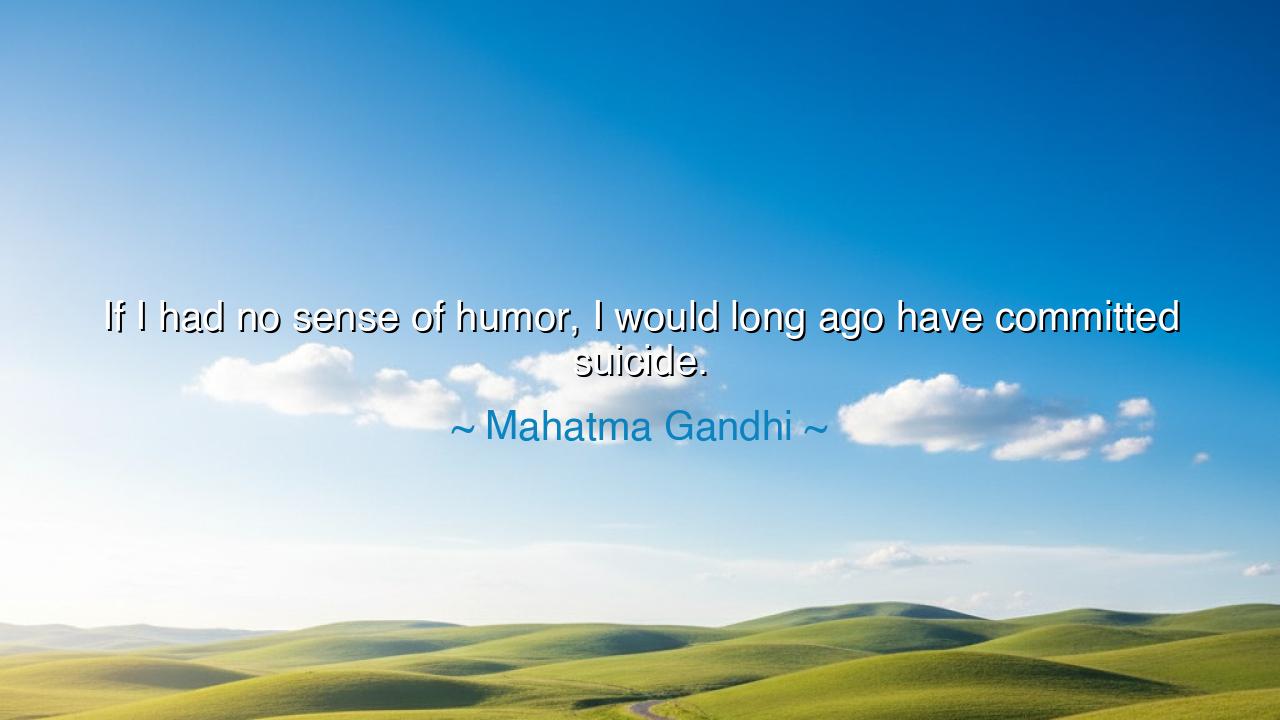
If I had no sense of humor, I would long ago have committed






The great soul, Mahatma Gandhi, once confessed with both gravity and grace: “If I had no sense of humor, I would long ago have committed suicide.” In this striking declaration, the father of India’s nonviolent revolution unveiled a truth of profound spiritual depth — that humor is not a luxury, but a lifeline; not a distraction from pain, but a force that redeems it. To Gandhi, laughter was not born of mockery, but of wisdom — a clear-eyed recognition that the burdens of life, though heavy, can be carried more easily by those who have learned to smile at them. His words are not flippant; they are the testimony of a man who bore the suffering of millions and yet found within himself the gentleness to laugh.
To understand Gandhi’s humor, one must understand the fires through which he walked. He lived through imprisonment, humiliation, and the daily strain of leading a nation in chains. The British Empire, vast and unrelenting, sought to crush his movement at every turn. Yet even in the bleakest moments, Gandhi would meet hostility with calm, and tragedy with wit. Once, when asked what he thought of Western civilization, he replied, “I think it would be a good idea.” Such humor was not arrogance — it was clarity, the laughter of a man who saw through the absurdities of power and pride. Humor, for Gandhi, was a weapon more powerful than anger; it disarmed without violence and healed without bitterness.
The ancients understood this kind of laughter well. The philosopher Epictetus, once a slave, taught that freedom begins within the mind — that one’s power lies not in changing the world, but in changing one’s response to it. Gandhi, who had studied such teachings, lived them in action. He knew that suffering untempered by humor turns to despair, but suffering softened by laughter becomes endurance. Just as steel must bend to avoid breaking, so must the spirit learn to yield — and laughter is that yielding of the soul, that gentle bow before the storm of life. In humor, the heart finds its breath again.
Consider the story of Nelson Mandela, who, like Gandhi, faced injustice with extraordinary patience. During his long imprisonment on Robben Island, Mandela was known to make jokes with his guards, lightening even the most brutal days. “I laugh,” he said, “not because I am free, but because laughter reminds me that I am still human.” His humor did not deny pain — it transcended it. In this, he walked the same sacred path as Gandhi: both men understood that laughter is not the opposite of sorrow, but its companion. To laugh in the midst of suffering is to declare that pain may test the body, but it will not own the soul.
Gandhi’s words also carry a hidden warning — that a life stripped of joy becomes unbearable. He does not speak of suicide as a threat, but as an image of despair: the death of the spirit that forgets how to smile. To lose one’s sense of humor is to lose the ability to step outside of suffering, to see life from a higher vantage — where even the impossible becomes endurable. His confession is, therefore, not one of weakness, but of strength. He reveals that the holiest among us are not those who never weep, but those who still find the courage to laugh between their tears.
The sense of humor Gandhi cherished was rooted not in mockery, but in compassion. He could laugh at himself, at his mistakes, at the vanity of the world, because he had transcended the need to appear perfect. This humility made him untouchable by despair. When a journalist once asked him if he considered himself a saint, Gandhi smiled and said, “Yes, if you think of a saint as a sinner who never gives up.” That is the laughter of wisdom — laughter that embraces imperfection and keeps walking anyway. To Gandhi, humor was not an escape from struggle, but the light by which he walked through it.
So, my listener, learn from the spirit of Mahatma Gandhi. When life feels unbearable, do not surrender your laughter. Guard it as your armor of light. Let humor remind you that the world, for all its cruelty, is not your master — that within you lives the power to face suffering with grace. Laugh not because life is easy, but because laughter keeps your heart alive. In every age and every hardship, this truth remains: humor is the breath of the soul under pressure, the quiet defiance of one who refuses to be broken. And as Gandhi taught us, it may well be the difference between despair and the endurance that changes the world.






AAdministratorAdministrator
Welcome, honored guests. Please leave a comment, we will respond soon